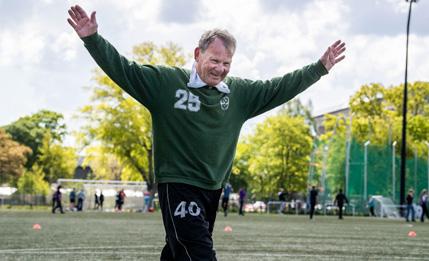
2 minute read
social issues in football

overcome constraints and strive to make an impact on well-being. We see and also believe that municipalities view and value these passionate firebrands, grateful for accomplishing the activities they organise. That is because municipalities in the Danish welfare society are responsible for the wealth of the citizens. The mission of offering activities creating a societal value for vulnerable people gives alongside the non-profit purposes, the NGO organisations tremendous legitimacy.
Advertisement
A fund-based world
One key insight from the NGOs working with socially vulnerable groups was that they have problems in getting money for their work. Because this stakeholder group is not permanently financed, they need to get money for projects from sources such as private or public foundations. They describe how the repetitive writing of application for funding requires a lot of resources and this is not easy.
"The way the funds are structured makes it difficult for us – it is not easy to go from application to application; it requires resources." Working in this ‘from-application-to-application system’ is somehow in contrast to the world of volunteering, which is a part of civil society. The NGOs aim to make life better for their target group. Writing and formulating applications is intuitively not a part of that, but it is a prerequisite for getting money in a project-based society. Based on the insights, because of the structuring of the funds application system, the NGO’s are forced to go for the money and become to some degree foundation-centred instead of project and/or activity-centred:
“A good project has possibilities to develop the project as it makes sense in the process, but we are often forced to go for the money and are working foundation-centred instead of project-centred. This blocks innovation because the evaluation has a limited focus.” The landscape of funding for NGO football is an unintended part of the organisational structure of Danish sport. As such, the Ministry of Culture's distribution of funds are tied up in the three major sports organisations:
“When DGI and/or DIF distribute funds, we cannot receive a share of these funds. So the allocation becomes coloured by a large-organisation filter - a monopoly-like factor/a politically controlled decision basis. As a grassroots organisation you have no direct channel of funding, as pointed out in the evaluation of street sports.” The innovation centre could have a political mission to help support these structural challenges.
NGO are challenges in collaboration with universities and lack research on social issues in football
Another key insight from the civil society stakeholder group is related to the collaboration with the academia sphere, universities, and other ‘knowledge’ institutions. With this focus, the NGO points out that they need more research in the area of football and socially vulnerable groups. Research and validation are important when the NGO meets the policymakers and in the process of applying for funds:








